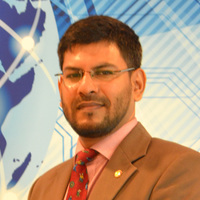- Department of Management
School of Business Management,
Universiti Utara Malaysia, 06010 Sintok, Kedah, Malaysia
A S A Ferdous Alam
Universiti Utara Malaysia, School of Business Management, Faculty Member
- Economics, Business, Social Sciences, Development Studies, International Studies, Dispute Resolution, and 30 moreInstitutional Economics and Environment, Environmental Science, International Cooperation, Environmental Sustainability, Climate Change, Globalization, Poverty, Palm Oil, Oil palm, Palm Oil Plantation, Sustainable agriculture, International Migration, Plantations, Contemporary International Migration, Economics of Remittances, Sociology of Migration, International Migration and Immigration Policy, Coastal Tourism, Impact of Social Sciences and Humanities, Research Proposals, Structure Equation Modeling Using AMOS, Migration, Remittances, International Labour Migration, Migration and Development, Migration Studies, South east Asia, Environmental policy, Agribusiness Economics, and Sustainable Tourismedit
- Dr. Ferdous is a highly accomplished Senior Lecturer at Universiti Utara Malaysia, with a strong background in resear... moreDr. Ferdous is a highly accomplished Senior Lecturer at Universiti Utara Malaysia, with a strong background in research and teaching. With 14 years of research experience and eight years of teaching students from diverse cultural backgrounds, he has demonstrated his expertise in both academic and supervisory roles. He holds a Ph.D. and post-doctoral researcher position from the National University of Malaysia, where he specialized in Development Economics. Prior to his doctoral studies, he gained valuable industry experience during his four-year tenure. He also pursued an MBA with a focus on Marketing, International Business, and HRM, as well as a BBA in Management. As a testament to his academic contributions, Dr. Ferdous has an impressive publication record. He has authored a total of 110 articles, including 50 journal papers published in reputable international journals. In addition, he has presented 49 research papers and six posters/magazines at various international academic conferences. His expertise is further showcased through his four book chapters and one editorial note. Dr. Ferdous's dedication to academic excellence is evident, as highest KPI achievement for the years 2019-2022, as well as the Excellent Service Award recipient, and one of the top authors for WoS/SCOPUS indexed journal publications. Dr. Ferdous is actively involved in various academic networks and research affiliations. He is an Associate Fellow of the Center for Sustainability Research and Consultancy (CSRC), a Senior International Research Fellow of The National Bureau of Economic Research (NBER), and a member of the CONNECTING ASIA research network. His engagements as an editorial member and reviewer for several indexed journals highlight his commitment to the scholarly community. His research interests are wide-ranging, covering Development Economics, Sustainability of Tourism, Oil Palm, and Palm Oil, Disaster Management, Business Management, Marketing, and International Business, among others. These diverse research areas demonstrate Dr. Ferdous's interdisciplinary approach and his ability to tackle complex issues across multiple fields. Find his short bio here: [https://lumen5.com/user/rialferdous/biography-of-dr-ferd-83f8f/]edit
This paper studies the role of stakeholders for tourism development in Malaysia based on the perceptions of tourists who come to the Melaka city. Even though the tourists are satisfied by the existing facilities available presently, there... more
This paper studies the role of stakeholders for tourism development in Malaysia based on the perceptions of tourists who come to the Melaka city. Even though the tourists are satisfied by the existing facilities available presently, there are a few shortcomings that need to be addressed such as neglected traditional issues, bureaucratic barriers, definition of sustainable tourism and communication problem with the local communities. The purpose of the study is to find out the roles of public, private and local community stakeholders of the historic city of Melaka for meeting the needs of tourists for tourism development. The findings indicate that the government, private and local community stakeholders have played positive roles for satisfying the demands of the tourists in shaping the development of sustainable tourism in Melaka. The primary data were collected through survey via interviews with 135 respondents based on their responses to a set of questionnaires which looked into ...
Research Interests:
This study discusses the migration of human capital in Bangladesh towards economic growth. Every year, Bangladesh exports the huge number of labors abroad for economic growth through remittances. The exports of human capital play a major... more
This study discusses the migration of human capital in Bangladesh towards economic growth. Every year, Bangladesh exports the huge number of labors abroad for economic growth through remittances. The exports of human capital play a major role to minimize the poverty level in Bangladesh in the last four decades. Remittances affect poverty eradication most directly by increasing the income of households which have a family member working abroad. Because income from remittances is usually larger than that which could have been earned by migrants they stayed at home. The aim of this study is to highlight and clarify the role of migration towards the growth of Bangladesh economy. The data for analysis is perceived from the secondary sources. The significant manipulations for acquired data are migration of human capital in Bangladesh. Migration contributed for the development of macro and micro level in Bangladesh. At micro level, migration of human capital may improve the human basic needs like foods, household incomes, health, housing and educational standards. At the macro level, improvement could be noticed in government revenue, higher education rate, sanitation and infrastructure. There would be potential benefits to world's poor if more international attention were focused on integrating migration policy to within the larger global dialogue economic development and poverty reduction. Strong institutions and good policies will enhance the benefits of human capital migration for Bangladesh.
